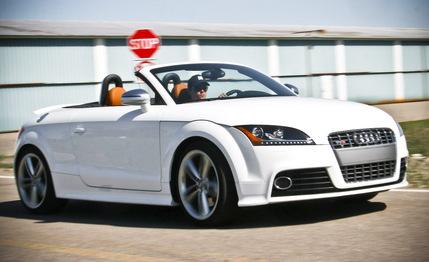 Short Take Road Test
Short Take Road Test

In the past, it was more than a stretch for us to call Audi’s TT a sports car. Fun? Yes. Stylish? Absolutely. But it wasn’t until our recent experiences with the 2009 TTS that we began to consider the little coupe/roadster a willing partner for back-road shenanigans.
Our tests have shown that the TTS coupe is capable of hitting 60 mph in 4.8 seconds, covering the quarter-mile in 13.5 at 104 mph, and clawing around the skidpad at 0.95 g. The droptop TTS flexed its sporting mettle in our recent $50K roadster comparison test, finishing a very close third behind the more expensive and more powerful Porsche Boxster S and BMW Z4 sDrive35i. (A distant fourth went to a Chevrolet Corvette convertible.)
Noted in that test were the TTS roadster’s unflappable composure and excellent ride-and-handling balance, but the little Audi was way, waaaay short of the other competitors in a straight line. Sixty mph came in 5.6 seconds, and the quarter-mile took 14.2 seconds at 99 mph; the next slowest car in the comparo, the Z4, hit 60 in 4.8 seconds and ran the quarter in 13.5 @ 106. You’ll notice the TTS’s numbers also seriously lag behind those of its fixed-roof sibling. A coupe outperforming its convertible variant is not unusual, but we thought the comparo TTS might have been a little lame, so we scheduled a retest on our home turf.
Let’s Try This Again
Enter the Ibis White TTS roadster you see here, which proved to be significantly more capable around our Ann Arbor HQ than the comparo car in California was. (We suspect the disparity is due to differing octane levels in the two states’ fuel supplies.) Carrying 170 additional pounds over the coupe, this TTS roadster managed the 0-to-60 sprint in 5.1 seconds and hung on for a quarter-mile pass of 13.7 at 102 mph. What’s more, it mirrored the coupe around the skidpad at 0.95 g and, at 155 feet, stopped one foot shorter from 70 mph. The first TTS roadster we tested managed 0.93 g and 160 feet.
The new figures confirm that the TTS is indeed an accomplished performance vehicle, with or without a metal lid. Driven hard, the roadster’s compact dimensions made it feel agile and playful, and its adaptive magnetic dampers kept body motions in check without punishing our backsides. Despite its short wheelbase, high-speed stability was good, and the upgraded brakes were reassuringly strong when we needed to scrub off lots of speed.
Aside from an exhaust note that was too subdued for some, our only real complaint was the pairing of the 265-hp, 2.0-liter turbocharged four-cylinder with the six-speed, dual-clutch automated manual, which is, unfortunately, the only configuration for the U.S.-market TTS. Despite a hefty shove of thrust when the turbo spools up, waiting for 17.4 psi of boost to build and the S tronic gearbox to engage makes the TTS agonizingly slow off the line. Of course, the transmission’s launch-control feature can remedy that—it was used to record our acceleration numbers—but who wants to go through that process at every stoplight? Under normal driving conditions, the initial lag of the powertrain—as long as two or three seconds, by our estimation—had more than one staffer fuming and questioning the car’s ability to pull safely into fast-moving traffic. Note to Audi: Please bring us the Euro TTS with the six-speed manual.
There’s More to It than Just Being Quick
TTs have never struggled to stand out on the road, and the TTS’s chiseled bodywork and optional 19-inch wheels nicely augment the basic TT shape. The look isn’t butch or racy like a Corvette, but it’s aggressively cute, evidenced by the frequent stares of female passersby—of all ages—as they swiveled their heads for a glimpse of the diminutive two-seater.
The inside of the TTS is equally attractive. The black and brown innards of our tester contrasted nicely with its white bodywork. Add plenty of aluminum accents, a slick, flat-bottomed steering wheel, baseball-glove-stitched sport seats, and Audi’s trademark attention to detail, and the TTS roadster is a great place to catch some rays. The trunk is relatively spacious even with the top down, and the power wind deflector between the seats keeps buffeting to a minimum. However, the car is small inside, with tight foot wells for the long-legged, and the folding softtop takes the place of the coupe’s token rear seats, which at least are good for stashing briefcases.
Sports-Car Lite
Although we’re pleased to see the TTS roadster deliver numbers on par with the coupe’s, we can’t help thinking any sports car worth its salt—particularly one costing $57,000 with options—shouldn’t stumble over its own drivetrain when trying to accelerate quickly from a stop. Expect the edgier TT RS coupe and roadster, with their turbo five-cylinders and six-speed manuals, to address that issue if they ever come stateside. But so would a slightly used Porsche Boxster, which costs about the same as a new TTS and is a more rewarding and user-friendly way to enjoy the sunshine.